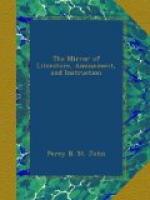The final production of the drama, however, was attended with more difficulty than he had anticipated. He had the usual prejudices to overcome, particular singers to conciliate, alterations to make, and repeated rehearsals to superintend, before he could inspire the performers with the proper spirit of the piece.
“Braham,” says he, “in another of his confidential letters to his wife,” (29th March, 1826) “begs for a grand scena instead of his first air, which, in fact, was not written for him, and is rather high. The thought of it was at first quite horrible; I could not hear of it. At last I promised, when the opera was completed, if I had time enough, it should be done; and now this grand scena, a confounded battle piece and what not, is lying before me, and I am about to set to work, yet with the greatest reluctance. What can I do? Braham knows his public, and is idolized by them. But for Germany I shall keep the opera as it is. I hate the air I am going to compose (to-day I hope) by anticipation. Adieu, and now for the battle. * * * * So, the battle is over, that is to say, half the scene. To-morrow shall the Turks roar, the French shout for joy, the warriors cry out victory!”
The battle was, indeed, nearly over with Weber. The tired forces of life, though they bore up gallantly against the enemy, had long been wavering at their post, and now in fact only one brilliant movement remained to be executed before they finally retreated from the field of existence. This was the representation of Oberon, which for a time rewarded him for all his toils and vexations. He records his triumph with a mixture of humility, gratitude, affection, and piety.
“12th April, 1826.
“My best beloved Caroline! Through God’s grace and assistance, I have this evening met with the most complete success. The brilliancy and affecting nature of the triumph is indescribable. God alone be thanked for it! When I entered the orchestra, the whole of the house, which was filled to overflowing, rose up, and I was saluted with huzzas, waving of hats and handkerchiefs, which I thought would never have done. They insisted on encoring the overture. Every air was interrupted twice or thrice by bursts of applause. * * * So much for this night, dear life. From your heartily tired husband, who, however, could not sleep in peace until he had communicated to you this new blessing of heaven. Good-night.”
But his joy was interrupted by the gradual decline of his health. The climate of London brought back all those symptoms which his travelling had for a time alleviated or dissipated. After directing twelve performances of his Oberon in crowded houses, he felt himself completely exhausted and dispirited.—His melancholy was not abated by the ill success of his concert, which, from causes which we cannot pretend to explain, was no benefit to the poor invalid. His next letters are in a desponding tone.




